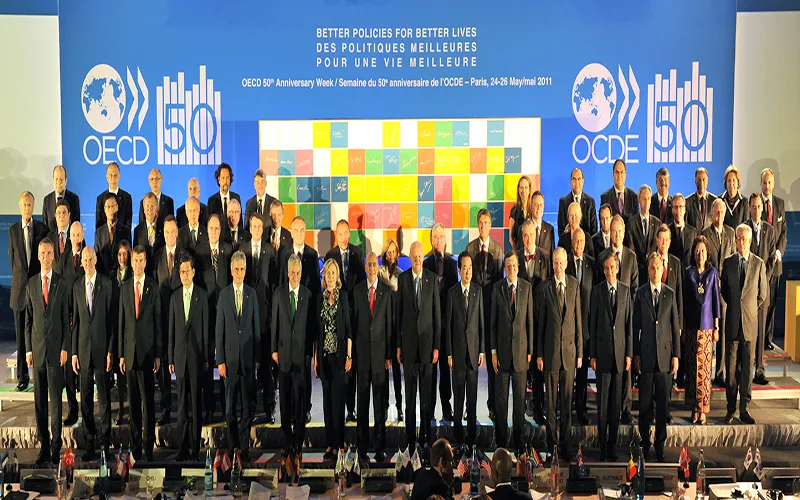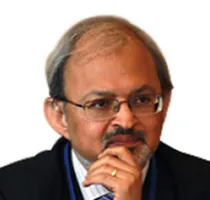Much water has flowed under the bridge since 1961 when the OECD was established. We no longer find ourselves in a world dominated by superpowers; the cast iron regimes of yesteryear have been shown to be weak and flailing, and the befuddled responses of even established regimes to contemporary challenges pose a whole host of new questions about the global governance apparatus.
Governance is essentially a power discourse, with the control of ideas and ideals at the very core. However, the debate on governance has never before witnessed such an intense and widespread contest between those governing and the governed.
The paradox is evident. On the one hand, parts of the world have seen clear battle lines between governments and their subjects. On the other hand, it has become increasingly difficult to separate the governed from the government as civil society sallies forth to take on roles that were hitherto thought to be the exclusive domain of governments.
One thing is clear: the rigidity of formal governance structures is constantly being challenged by an ever-shifting mosaic of public perceptions regarding the relevance of the once-revered GDP-led growth and development.
State-centric governance models as well as multilateral organisations drawing upon these traditional models usually collate their experience to define sets of universal rules, which then become templates for policy and good governance. But these homogenised policy frameworks, already under stress when applied to diverse geographies, are about to be severely tested. The cry for new institutions and new frameworks that can draw upon alternative experiences far closer to home is only going to get louder. Let us look at the emerging shoreline representing the developing economies, and the muscling-in of low-income countries onto the global stage for the first time. In many of these countries, governance systems, often transplanted from faraway lands, have led to weak normative structures that only partially fit in with social norms and values. As a result, these systems reveal an inability to respond to mounting demographic and economic pressures, creating divisions, such as those between the haves and the have-nots, right across the spectrum of human need.
Given this reality, conflicting interests scattered along the trajectory of growth run the risk of creating impulses that contradict the current dominant discourse about globalisation. The global arena may therefore play host to a bewildering array of associations and coalitions, with diverse demands and a perplexing tendency to shift positions over time. This, in turn, will demand equally diverse strategies on the part of organisations as well as governments. Can this work?
Take urbanisation. At a very basic level, within emerging economies, the unprecedented movement of people to urban agglomerations is a daunting phenomenon driven by the inexorable logic of economic growth. Large parts of the emerging and developing world are experiencing urbanisation on an unprecedented scale. In China and India, which represent over a third of the world’s population, this mass movement towards cities has never happened at such a rapid pace. India’s cities and towns are expected to grow by another 20%, adding nearly 300 million people to old and new urban centres in just over two decades.
Unlike many Atlantic countries, where urbanisation has resulted in sprawling suburbs, India is witnessing something quite different. Since facilities, infrastructure and utilities favour city centres, people gravitate towards city centres. Consequently, the largest slums, home to the most marginalised sections of the population, co-habit with seats of political power, financial districts and business centres. This inward drift poses its own unique set of challenges to governance as these veritable "villages within the city" multiply.
India’s vast cultural diversity has always stood out as both a metaphor and a symbol of the virtual idea that this enormous nation embodies. As populations move, each of its vast and dispersed urban agglomerations reflects, in effect, a microcosm where people enact this diversity in day-to-day reality. Multiple identities, aspirations and consumption patterns give rise to new heterogeneous narratives, reflecting sometimes common, sometimes different, priorities. To function, governance structures have to accommodate the myriad interactions these entail, while preserving the sanctity of the different spaces that each may demand within these cities and towns.
In practice, national governments and international organisations will be increasingly challenged just to keep up with, let alone predict, manage or govern these grassroots impulses. The sheer diversity of these impulses is bound to give rise to a complex labyrinth of networks and connections loosely linking individuals and organisations through shifting coalitions across a new interconnected world. Traditional state apparatuses and global organisations conceptualised as undeviating, structured systems will often be hard pressed to maintain or assert their relevance within this reality. Governance structures will have no choice but to evolve.
Nowhere is this more evident than in the treatment of that buzz word-human security. In effect, human security poses one of the biggest challenges to traditional structures, as the needs of the individual constantly conflict with the conventional wisdom of state-centrism. The human that the state seeks to serve and protect can no longer be viewed as a passive object with a preconceived set of needs, or with pre-ordained aspirations that conform to behaviour as "observed" in other nations or societies, at a different time and in a different place.
Simultaneously, instead of universal governance, there is a trend towards disaggregation within many nation states themselves. The rise of anti-migrant sentiments, trade protectionism and the call for increasing federalisation in many parts of the world run counter to all attempts to homogenise the "global village".
Likewise, the ongoing debate on sustainable development and the UN Millennium Development Goals also reflects the obduracy of those wedded to narratives about homogenous development. The developing world may not necessarily continue to grow along predefined trajectories of income or consumption, so it is almost wishful thinking to base policies and mandates on deterministic and linear frameworks and expect smooth outcomes at some time in the future.
To reimagine governance, it will be important to look again at the human terrain and, as a first step, appreciate its diversity. The 21st-century governance challenge is to manage globalisation while preserving the sanctity of individual pathways that humans may choose to follow in pursuit of their dreams. Common values may not exist in an unequal world, but common aspirations might. We must strive to serve diversity, not to suppress it.
(The writer is the Director of Observer Research Foundation)
Courtesy: OECD Observer
The views expressed above belong to the author(s). ORF research and analyses now available on Telegram! Click here to access our curated content — blogs, longforms and interviews.

